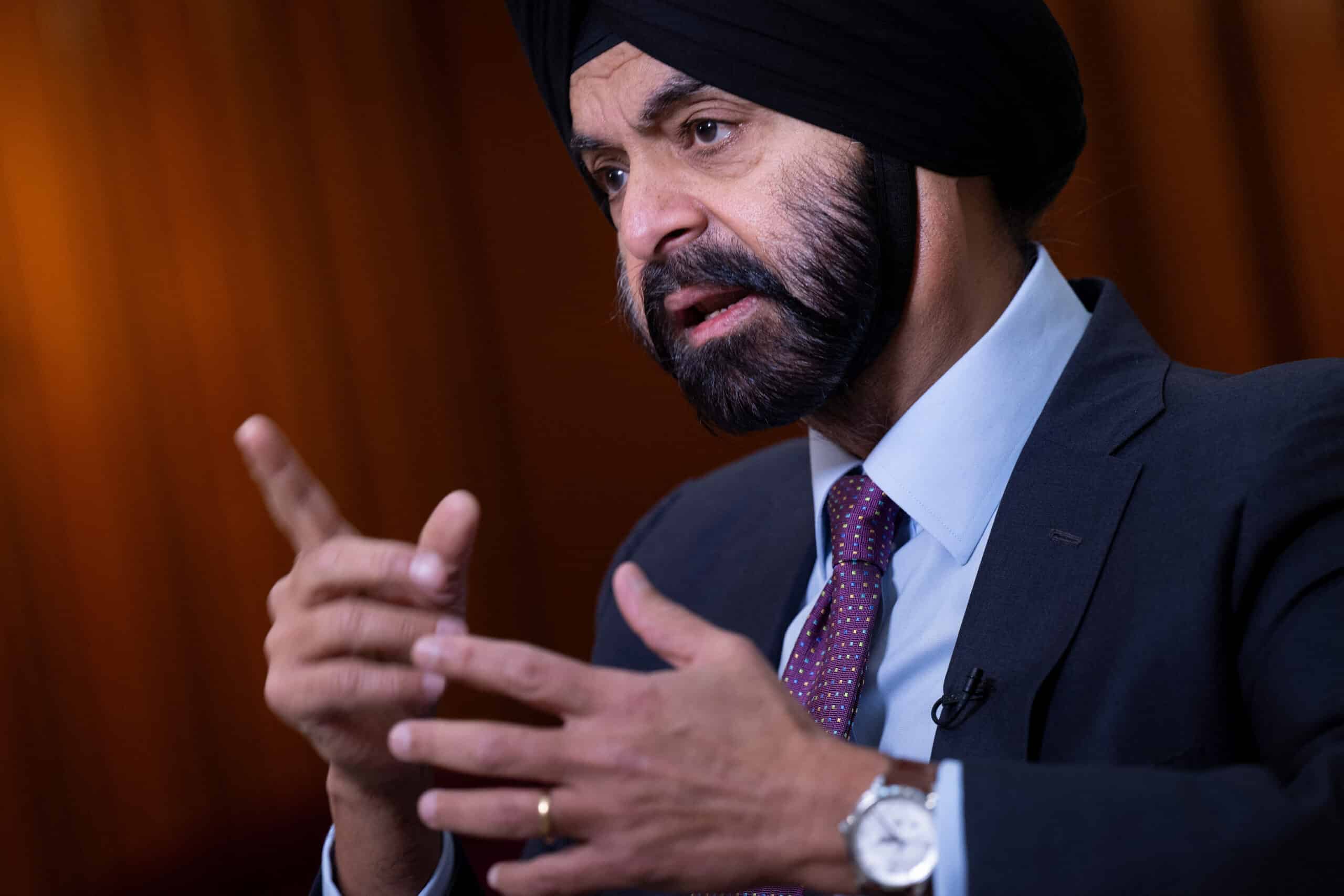
World Bank Group President Ajay Banga speaks during an interview at the World Bank Headquarters on October 17, 2024, in Washington, DC. – Banga said in an interview that the World Bank will unveil plans to tackle job creation, gender disparities, and food security at the Annual Meetings of the International Monetary Fund and the World Bank Group, which begin on Monday, October 21, 2024. (Photo by Brendan Smialowski / Agence France-Presse)
WASHINGTON, United States — The World Bank will unveil plans to tackle job creation, gender disparities, and food security at next week’s gathering of the world’s finance ministers and central bankers in Washington, its president said in an interview.
Ajay Banga spoke to Agence France-Presse at the development lender’s headquarters in Washington ahead of the Annual Meetings of the International Monetary Fund and the World Bank Group, which begin on Monday, October 21.
Banga, who is 16 months into his term running the 80-year-old institution, said he had made significant progress on his plans to create “a better bank and a bigger bank,” and was now focusing on job creation as a key World Bank objective.
According to the former Mastercard chief executive, “1.2 billion young people in the emerging markets will become eligible for a job over the coming 12 to 15 years.”
“The same countries are currently forecast to generate a little north of 400 million jobs. That’s a big gap,” he added.
READ: World Bank upgrades PH growth outlook, flags AI risks
“If you don’t give them clean air, clean water, healthcare, and education when they’re growing up, and a job when they’re ready, then you end up with social challenges, migration, social circumstances, an unhealthy population,” he further said.
“So we’ve got to find ways to attack this issue with some urgency.”
To that end, the World Bank has created an advisory council on jobs led by Singaporean President Tharman Shanmugaratnam and the former Chilean president Michelle Bachelet. The advisory council will meet for the first time in Washington on Wednesday, October 23.
The question they will seek to answer, Banga said, is: “How do we translate all that with the right regulatory policy to get jobs on the ground in these countries?”
Of those 1.2 billion young people, at least one third will be in Africa, making job creation on the continent a priority, he added.
The World Bank likewise plans to announce new goals to tackle global gender disparities and to boost agribusiness to tackle food security.
World Bank plans are still ‘wet paint’
One of Banga’s key objectives since taking office has been to look for ways to boost the role of the private sector in international development.
The World Bank previously estimated that developing countries will need an average of $2.4 trillion each year between now and 2030 in order to address the challenges posed by climate change, conflict, and pandemics – significantly above the bank’s current annual commitments.
To do so, the bank set up a private sector “investment lab” in 2023 with the CEOs of major private sector firms, which has now come back with a number of recommendations.
READ: World Bank to PH: Invest in youth now for better economy
These include providing regulatory and policy clarity, tackling foreign exchange risk, providing better political risk guarantees, shouldering some of the risk of investing in developing economies, and packaging loans together to create a new “asset class,” Banga said.
For this last recommendation, Banga has tapped S&P Global CEO Doug Peterson to lead a working group to say: “What needs to change for us to get to scale, size and replicable, standardized loans of large enough numbers that you can bring fairly large sums of money to work in this process?”
But he cautioned that many of these plans were still in their infancy.
“All of these are wet paint,” he said. “This takes time.”
Gaza reconstruction
Amid Israel’s ongoing campaign against Hamas in Gaza, Banga said the World Bank board had voted recently to increase its assistance to the Palestinian Authority for use in Gaza to $300 million, six times the figure for the previous year.
Israel has been at war with Hamas since the October 7 attack, which resulted in the deaths of 1,206 people, mostly civilians, according to an AFP tally of official Israeli figures.
Israel’s retaliatory campaign in Gaza has killed 42,438 people, the majority civilians, according to data from the health ministry in the Hamas-run territory, which the UN considers reliable.
The World Bank now estimates the cost of reconstruction in Gaza at more than $14 billion, Banga said, adding that the bank had formed a group composed of Palestinians, Israelis, Jordanians, Egyptians, the European Union and the United States, to look at how to rebuild after the war ends.
“There are a number of Middle Eastern countries – Saudi Arabia, for example – who are very interested in contributing to this thinking, because they see that redoing this the right way is the best, longer-term solution for economic growth there,” he said.
“So I think we’ll get more partners on board over the coming month or two,” he added.